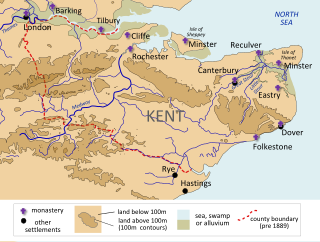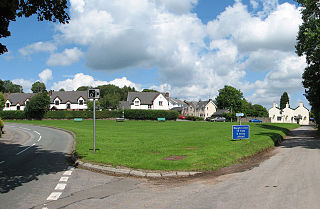See also
- MV Cuthred, an Isle of Wight ferry (1969–1990)
| This page or section lists people that share the same given name. If an internal link led you here, you may wish to change that link to point directly to the intended article. |
Cuthred is a given name. Notable people with the name include:
| This page or section lists people that share the same given name. If an internal link led you here, you may wish to change that link to point directly to the intended article. |

Year 740 (DCCXL) was a leap year starting on Friday of the Julian calendar, the 740th year of the Common Era (CE) and Anno Domini (AD) designations, the 740th year of the 1st millennium, the 40th year of the 8th century, and the 1st year of the 740s decade. The denomination 740 for this year has been used since the early medieval period, when the Anno Domini calendar era became the prevalent method in Europe for naming years.

Mercia was one of the kingdoms of the Anglo-Saxon Heptarchy. The name is a Latinisation of the Old English Mierce or Myrce, meaning "border people". Mercia dominated what would later become England for three centuries, subsequently going into a gradual decline while Wessex eventually conquered and united all the kingdoms into the Kingdom of England.

The British royal family comprises Queen Elizabeth II and her close relations. There is no strict legal or formal definition of who is or is not a member of the British royal family.

Æthelbald was the King of Mercia, in what is now the English Midlands from 716 until he was killed in 757. Æthelbald was the son of Alweo and thus a grandson of King Eowa. Æthelbald came to the throne after the death of his cousin, King Ceolred, who had driven him into exile. During his long reign, Mercia became the dominant kingdom of the Anglo-Saxons, and recovered the position of pre-eminence it had enjoyed during the strong reigns of Mercian kings Penda and Wulfhere between about 628 and 675.

The Kingdom of the Kentish, today referred to as the Kingdom of Kent, was an early medieval kingdom in what is now South East England. It existed from either the fifth or the sixth century CE until it was fully absorbed into the Kingdom of Wessex in the late 9th century and later into Kingdom of England in the early 10th century.

Earl of Wessex is a title that has been created three times in British history, twice in the pre-Conquest Anglo-Saxon nobility of England and once in the Peerage of the United Kingdom. The region of Wessex, in the south and southwest of England, had been one of the Anglo-Saxon kingdoms, whose expansion in the tenth century created a united Kingdom of England.

Cuthred was the King of Kent from 798 to 807.
Æthelheard, also spelled Ethelheard, Edelard or Æþelheard, was King of Wessex from 726 to 740. There is an unreliable record of Æthelheard having been the brother-in-law of his predecessor, Ine, but his ancestry is unknown, perhaps making him the first King of Wessex not to be descended from Cynric by blood.

The House of Wessex, also known as the House of Cerdic, refers to the family that initially ruled a kingdom in southwest England known as Wessex, from the 6th century under Cerdic of Wessex until the unification of the Kingdoms of England by Alfred the Great and his successors. Alfred and his successors would also be part of this dynasty, which would continue ruling in the main line all the way until Alfred's descendant, Ethelred the Unready, whose reign in the late 10th century and early 11th century saw a brief period of Danish occupation and following his and his son Edmund Ironside's death, kingship by the Danish Cnut the Great and his successors to 1042. The House of Wessex then briefly regained its power for 24 years, but after the deposition of its last scion, Ethelred's great-grandson Edgar Ætheling, it faded into the annals of history. Edgar himself died after a long and adventurous life sometime after 1125. All kings of England and Great Britain since Henry II have nevertheless been descended from the House of Wessex through Henry I's wife Matilda of Scotland—a daughter of Edgar Ætheling's sister, Margaret of Wessex.
Cenwalh, also Cenwealh or Coenwalh, was King of Wessex from c. 642 to c. 645 and from c. 648 until his death, according to the Anglo-Saxon Chronicle, in c. 672.
Sigeberht was the King of Wessex from 756 to 757.
Cuthred or Cuþræd was the King of Wessex from 740 until 756. He succeeded Æthelheard, his relative and possibly his brother.

Cynegils[kyneɣɪls] was King of Wessex from c. 611 to c. 642. Cynegils is traditionally considered to have been King of Wessex, but the familiar kingdoms of the so-called Heptarchy had not yet formed from the patchwork of smaller kingdoms in his lifetime. The later kingdom of Wessex was centred on the counties of Hampshire, Dorset, Somerset and Wiltshire but the evidence of the Anglo-Saxon Chronicle is that the kingdom of Cynegils was located on the upper River Thames, extending into northern Wiltshire and Somerset, southern Gloucestershire and Oxfordshire, and western Berkshire, with Dorchester-on-Thames as one of the major royal sites. This region, probably connected to the early tribal grouping known as the Gewisse, a term used by Bede for the West Saxons, lay on the frontier between the later kingdoms of Wessex and Mercia.

Cwichelm was an Anglo-Saxon king of the Gewisse, a people in the upper Thames area who later created the kingdom of Wessex. He is usually counted among the Kings of Wessex.
Cenberht was a king in the lands of the West Saxons.

Devauden is a village and community in Monmouthshire, southeast Wales. It is located between Chepstow and Monmouth near the top of the Trellech ridge on the B4293 road. The community covers an area of 3,790 hectares (14.6 sq mi). The community includes the villages of Itton and Wolvesnewton, Llanfihangel-tor-y-mynydd and Newchurch.
Events from the 8th century in England.

The Heptarchy is a collective name applied to the seven kingdoms of Anglo-Saxon England from the Anglo-Saxon settlement of Britain in the 5th century until the 8th century consolidation into the four kingdoms of Mercia, Northumbria, Wessex and East Anglia.

MV Cuthred was an Isle of Wight ro-ro ferry built in 1969. From 1990 until 2009, she operated as Mira Praia in Portugal.